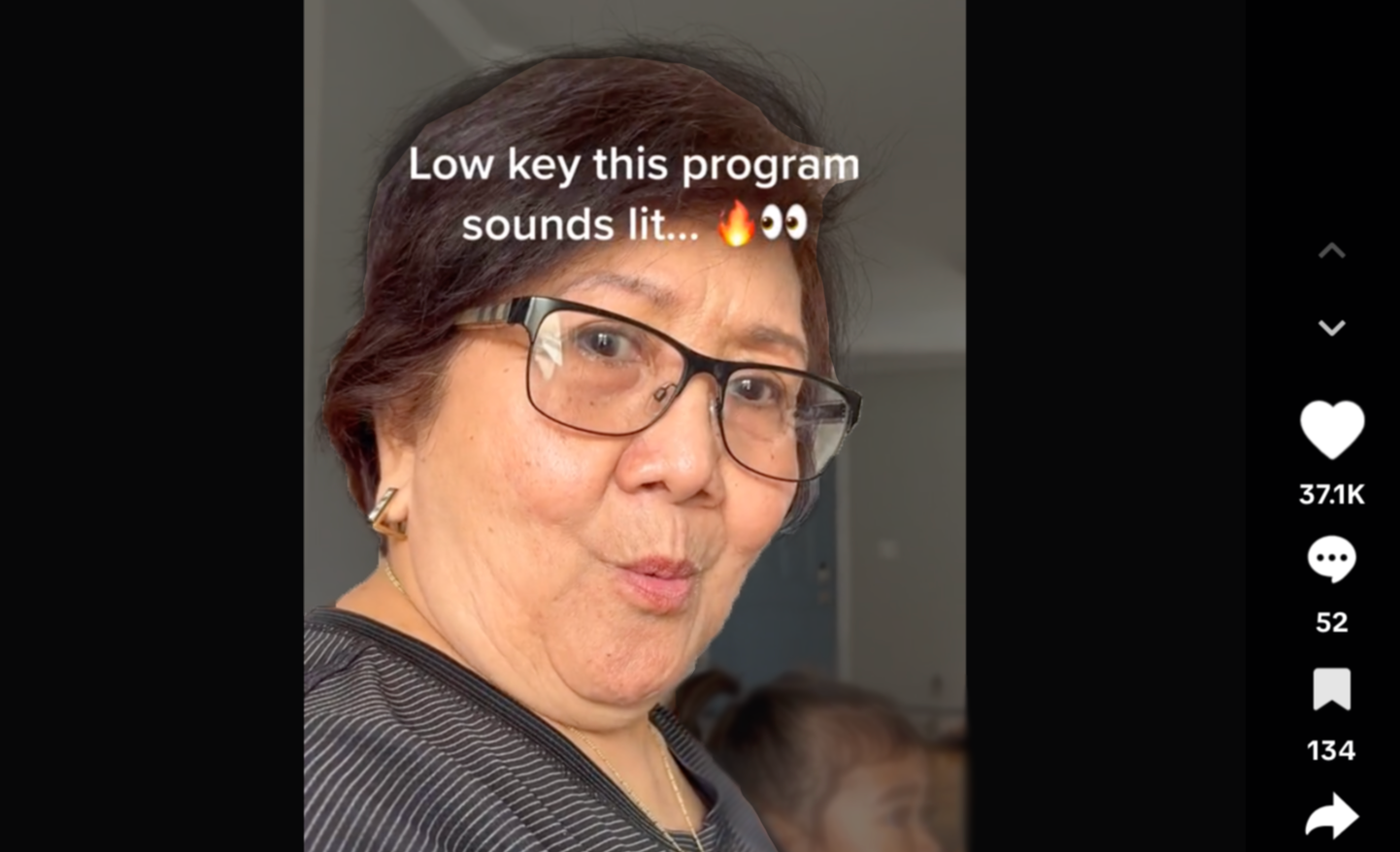A “granfluencer” known as “our Filipino grandma” is among an army of US-based influencers being used by fossil fuel giants to promote major polluters to younger audiences, DeSmog can reveal.
TikTok star Nora Capistrano Sangalang – known as “Mama Nora” or “Lola” – is best known for posting videos of her family and her insistence that her young fans are well fed.
In September 2022, however, she stepped into a new realm – posting an advert promoting Shell’s fuel rewards programme to her over two million followers on TikTok and Instagram.
While the video racked up around 40,000 likes across both platforms, it also attracted dozens of negative comments from Sangalang’s fans, some of whom said they would be unfollowing her account.
“Love your account but why would you ever partner up with Shell, a company that has caused environmental disasters and is a major contributor to climate change?”, one follower said.
The post came months after Shell had advertised for a new staff member to manage its TikTok campaigns, and was part of a wider campaign to promote the 10 year anniversary of its fuel rewards programme.
DeSmog’s research found that Sangalang is among more than 100 influencers who have been used to promote oil and gas giants worldwide since 2017, from the US to Malaysia, reaching billions of people.
Sangalang, like many other “granfluencers”, shot to TikTok stardom during the Covid pandemic. Her grandson, Jeffrey Juarez, who came up with the idea for the account and has managed it since, has previously described his “Lola” as “everyone’s TikTok/Internet/Filipino grandma”.
Sangalang, who is based in New York and typically posts feel-good videos about her love of her grandchildren, is among several “granfluencers” who have made headlines in recent years for challenging stereotypes about ageing, while also making healthy sums from their large followings via paid partnerships with brands.
A Shell spokesperson said that, “People are well aware that Shell produces the oil and gas they depend on today. However, what many don’t know is that we are also investing billions of dollars in low- and zero-carbon solutions globally as part of our efforts to support the energy transition.
“No energy transition can be successful if people are not aware of the alternatives available to them. Making our customers aware – through advertising or social media – of the low-carbon solutions we offer now or are developing is an important and valid part of our marketing activities.”
Juarez and Sangalang declined to comment.
READ MORE: Fossil Fuel Giants Are Using British Influencers to go Viral
‘Drive Carbon Neutral’
Shell’s use of Sangalang appears to be part of a concerted push from oil and gas supermajors to improve their image among younger generations.
Edelman, one of Shell’s principal PR agencies, said in relation to a 2017 campaign that the oil and gas giant set the task of “giving millennials a reason to connect emotionally with Shell’s commitment to a sustainable future”.
This mirrored a BP strategy document leaked in 2020, which showed how the firm sought to “reach influencers” in order to become “more relatable, passionate, and authentic” and “win the trust of the younger generation” – admitting that the company is “seen as one of the bad guys”.
In the US alone, DeSmog found 70 influencers, with a combined following of 17.5 million, who had promoted fossil fuel firms since 2017.
The Shell fuel rewards programme promoted by Sangalang was also shared by several popular accounts, including hair influencer “Sarabesnakin” (2.6 million followers on TikTok), travel blogger “Travelwithtalia” (242,000 followers on Instagram, 64,000 on TikTok), and dogfluencer “Mostlythedoodle” (290,000 followers on TikTok and 140,000 on Instagram).
In the US and elsewhere, a number of influencers have posted content that promotes the highly disputed claim that fossil fuel companies are at the forefront of the green transition.
A number of Canada based influencers promoted Shell’s “drive carbon neutral” programme, through which Shell claims to purchase carbon credits equivalent to your emissions to reinvest in “nature-based solutions projects”.
This process – known as “carbon offsetting” – has been heavily criticised after a Guardian investigation found that the carbon credits bought by major corporations (including Shell) are largely worthless and could make global heating worse. This investigation was released more than two years after the Canadian influencers posted their content.
“These public messaging efforts form part and parcel of a broader greenwashing strategy of which the objective is to portray Shell as a global champion in the energy transition,” Gregory Trencher, an Associate Professor at the Graduate School of Global Environmental Studies, Kyoto University, told DeSmog.
“Yet this is far from the reality, as despite having a goal in place to reach net zero emissions, Shell has abandoned its plan to reduce its production of oil by 1-2 percent each year up to 2030 and it has reaffirmed plans to grow its gas production.”
And Shell is not the only fossil fuel firm that is experimenting with influencer advertising.
The oil and gas company Conoco paid Lizzy, a nail artist with half a million followers on TikTok, to produce a series of videos promoting the firm, fetching over a million views and thousands of likes across TikTok and Instagram.
Francesca Willow, an eco-influencer, has previously turned down a paid partnership offer from a Texas-based oil and gas company, and she says that PR agencies need to be increasingly mindful about working for polluting clients.
“If you’re a PR agency who reaches out to an influencer for your sustainable brand, but people know that you have also worked for Chevron, for example, I wouldn’t be surprised if more influencers turn around and say that they’re not going to give you their money,” Willow told DeSmog.
All the influencers named and cited were approached for comment.
Update, 16 August: This article has been amended to reflect the fact that Conoco, rather than ConocoPhillips, sponsored Lizzy the nail artist
Subscribe to our newsletter
Stay up to date with DeSmog news and alerts








